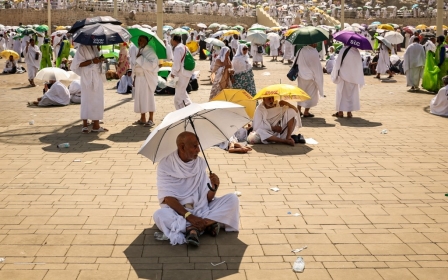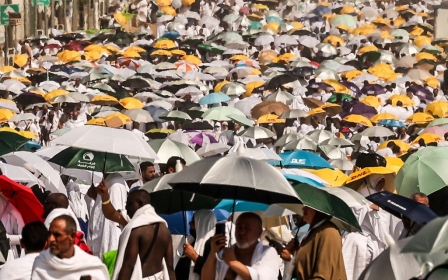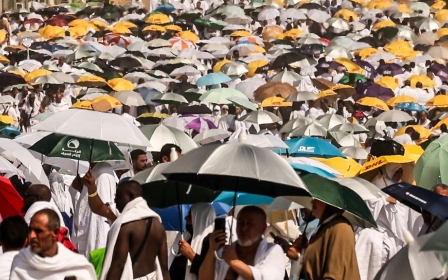Saudi Arabia detains Egyptian cancer patient who criticised Hajj deaths
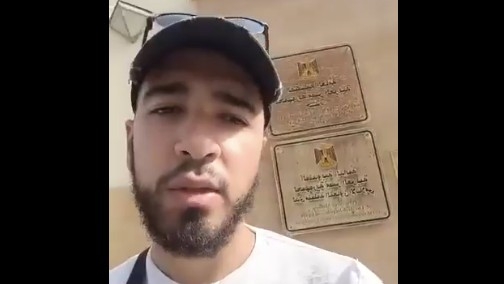
Saudi authorities have detained an Egyptian man after he posted an online video during Hajj criticising the alleged neglect that led to the deaths of hundreds of Egyptian pilgrims.
According to a video posted online by his father, Islam Osama Sobhi, 27, is currently held in custody in Taif after the Egyptian consulate in Jeddah surrendered him to security services for investigation.
Sobhi, who has cancer, is detained in connection with a viral video he posted on social media during Hajj earlier this month, where he expressed shock and denounced the deaths of many Egyptian pilgrims due to extreme heat and the lack of ambulance services and bus transfers.
In his video, Sobhi said that he and his companions were forced to walk for 10 hours as buses and cars refused to allow them to board.
“People have died. My roommate has died. We’ve been collecting bodies from the streets. I fell down many times,” he said in the now deleted video.
New MEE newsletter: Jerusalem Dispatch
Sign up to get the latest insights and analysis on Israel-Palestine, alongside Turkey Unpacked and other MEE newsletters
“Probably over 1,000 Egyptians died. I kept seeing Egyptian bodies strewn on the streets. And ambulances refused to stop.”
'I am here to surrender myself and to ask them to have a solution. I haven't had food or medical care for two days'
- Islam Osama Sobhi, Egyptian pilgrim
Sobhi said he was performing Hajj on a non-Hajj visa, and therefore he wasn’t officially registered as a pilgrim.
Registered pilgrims carried a smart card that allowed them to take buses and use other facilities, including hospitals and ambulance services.
Middle East Eye has reported that both registered and unregistered pilgrims suffered from inadequate facilities during Hajj, including being refused entry to buses and ambulances.
Saudi Arabia said over 1,300 people died during Hajj this year, most of them unregistered pilgrims.
The deaths constitute the worst heat-related Hajj disaster in 40 years. In August 1985, around 1,012 pilgrims reportedly died of extreme heat in temperatures exceeding 50 degrees celsius.
A Saudi security source told MEE this week that the actual death toll this year might be three to four times higher than reported, and that no official comment would be made on these numbers unless the deaths were due to an accident, similar to the 2015 Mina stampede where official figures reported 769 deaths and 694 injuries, while the Associated Press estimated more than 2,121 deaths.
“Saudi authorities should respect human rights and freedom of expression, and stop the arbitrary arrest of Islam Sobhi,” the Arab Organisation for Human Rights said on Tuesday.
It also urged authorities to provide him access to a lawyer as well the necessary medical care as a cancer patient.
Middle East Eye has asked the Saudi government for comment on Sobhi's case.
Apology and surrender
In another video, Sobhi said he received a barrage of insulting messages from Saudis due to his comments on Hajj.
“I didn’t mean to insult the Saudi government or people,” he said in his second video.
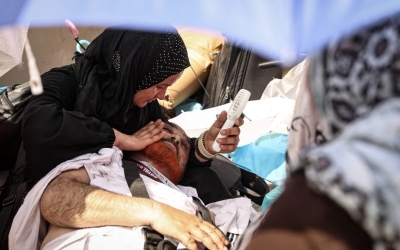
“God knows why I spoke this way. I wanted them to rescue people. I’ve deleted the video.”
In a third video on 23 June, Sobhi filmed himself at the Egyptian consulate in Jeddah where he surrendered himself.
“I am here to surrender myself and to ask them to have a solution. I haven't had food or medical care for two days,” he said, asking for urgent medical help.
“I am very sick. Please send me an ambulance or medical care.”
According to Sobhi’s father, his son was diagnosed with cancer during his military service in Egypt and then discharged and given 120,000 Egyptian pounds (around $2,500) compensation.
He decided to use the money to pay for Hajj, one of the five pillars of Islam that adult Muslims are obliged to perform at least once in their lifetime.
The father added that he trusts “Saudi rule of law” and called on authorities to protect his son’s life.
“I have only one demand: protect my son’s life, and provide him medical care. I am ready to pay for the medical care.”
Middle East Eye delivers independent and unrivalled coverage and analysis of the Middle East, North Africa and beyond. To learn more about republishing this content and the associated fees, please fill out this form. More about MEE can be found here.


